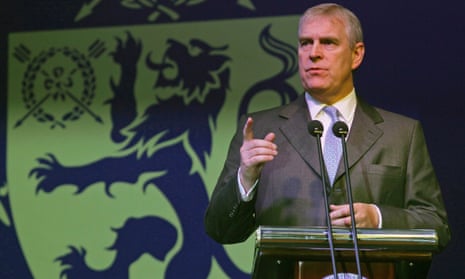The Prince Andrew story will not lie down despite Buckingham Palace’s unprecedented issuing of “categorical” denials and its scramble “to quell the growing crisis.”
For the third day running, with very few new facts available since it first broke, it has secured big coverage again today.
Nine national titles give it front page billing. It is the splash in the Daily Mail, Daily Mirror, the Sun and Metro. The Guardian, the Times and Daily Telegraph carry page 1 reports, while the Daily Express and Daily Star publish teasers, with the latter referring to it baldly as the “royal sex crisis”.
The Mail and Mirror each carried five pages on the story. It merits full pages in the Guardian, Times and Telegraph. And I note that it has attracted widespread attention on newspaper websites.
According to the Times, the prince “may be questioned by US prosecutors over claims that he lobbied on behalf of a billionaire paedophile accused of supplying him with an under-age ‘sex slave’”.
The “billionaire” is Jeffrey Epstein, who served 13 months of an 18-month jail sentence in 2008-9 after pleading guilty to soliciting prostitution. He is a registered sex offender.
In 2011, the News of the World published a picture of Epstein with Prince Andrew strolling together in New York’s Central Park. (Praise, incidentally, to Mazher Mahmood for that scoop).
That revelation prompted what can only be described as negative media coverage for the man who is now fifth in line to the throne. It was a major reason for him losing his “job” as a trade envoy.
Years on, the sudden eruption of the Epstein-Andrew link is entirely due to a court filing in the United States on behalf of a woman who contends that she was Epstein’s “sex slave”.
As such, she claims to have had been required to have sexual relations with Prince Andrew on three occasions in three different locations.
I have no time for the prince nor, given that I’m a republican, no time at all for the royal family’s privileges. But, in the interests of fairness and as a caution, I think we need to see his current plight in the context of similar media feeding frenzies when people are accused of crimes.
Although the Andrew case relates to detailed allegations in a document filed with a court, it is undeniable that it places him - in media terms - on a hiding to nothing.
I am not calling into doubt what the woman has said. Nor am I accepting the palace denials (I agree with Libby Purves on that matter, see below). I am not taking sides. I am merely pointing to the dangers inherent in this kind of situation.
These are allegations. They have not been tested in court. Clearly, another of the people named in the filing - Epstein’s lawyer, Alan Dershowitz - would welcome the opportunity to do so. He told the Guardian the woman’s accusations against himself were “totally false and made up”.
Similarly, Ghislaine Maxwell - alleged by the woman to have procured her on Epstein’s behalf and acted as his “madam” - finds herself in the headlines. She has denied the claims, but that hasn’t stopped the innuendo.
Her spokesman referred to the claims as “obvious lies and should be treated as such.” Note his following warning: they should not be “publicised as news, as they are defamatory.”
Who, in such circumstances, can be sure of the truth? And, if so, should newspapers be more careful? I noted, incidentally, the ambiguity of the Mail on Sunday in its presentation of the woman’s story.
All that having been said, and putting the specific allegations to one side, there cannot be any doubt that it was crass misjudgement for the prince to consort with a sex offender after he had been released from jail.
No wonder a Daily Mirror editorial, in accepting that “the explosive allegations” have been denied, argues that Andrew “has brought shame on the royal family and Britain”.
Three leading commentators have weighed in on the story too. Libby Purves, in a Times column headlined “Dimwit Andrew needs to come out fighting”, argues that the “poor sap” prince is a victim of his own stupidity. She writes:
“He should have known better than to befriend Epstein, let alone have the muttonheaded loyalty to stroll publicly with him after his release from prison...
But Prince Andrew dazzles easily when confronted with immense wealth and apparent power. He has fallen for ‘friendships’ with bad, corrupt and clever men, not only in the US but in Libya, Kazakhstan, Uzbekistan, Tunisia, wherever.”
Now, she says, he must speak out despite the official press releases, not least because “the currency of palace denials never recovered from the Charles-Diana war of words.”
Peter Oborne, writing in the Telegraph, thinks the republican cause “is celebrating its best week of the 21st century.” He links the Andrew drama to the row over Prince Charles’s blocking of the BBC documentary, Reinventing the royals. Both princes lacked judgment, he writes.
In conceding that the allegations against Andrew have been denied, Oborne thinks “the proven facts are grim”. What, he asks, was the prince “doing, in the first place, with Epstein, a paedophile who was jailed in 2008 for soliciting young girls for under-age prostitution?”
He lists examples of Andrew’s “penchant for rackety dictators” and believes that this latest controversy has resulted in republicans “rubbing their hands in glee”.
Yasmin Alibhai-Brown certainly seems to be enjoying the spectacle of the prince’s embarrassment. In the Independent, she argues that the “scandal” should “raise questions about our monarchy, its role and position, the devious, secret way it operates”. She writes of Andrew:
“The palace has never denied that he has, for years, been cavorting with insalubrious billionaires and vicious autocrats. Human rights? Why should an ageing, playboy prince care about those?
Prince Charles is matey with Arab despots too. The next time you feel the urge to denounce Robert Mugabe, remember these royal appeasers. Yes Blair, Clinton and Bush also had unsavoury friendships. But they lost power, eventually. Our royals can carry on sleazing indefinitely.”
She also takes up the point about the royal pressure on the BBC to delay the broadcasting of the Reinventing documentary:
“Imagine what the reaction would be if, say, Tony Blair stopped the BBC from broadcasting a critical programme on his activities. Britons would be outraged. But with the royal family, there is only quiet acquiescence. We are subjects after all, the great brainwashed”.
And here comes the rubbing of hands at the monarch’s plight (a view that echoes mine):
“We will not have a credible meritocracy until this unholy edifice is dismantled. I know monarchists will say privileged families are found in strong republics too and that this system gives us stability and unity. All bosh.
Wealth is indeed passed on by the rich everywhere, but they are not subsided by their nations, and they are not revered”.
Fair enough in republican terms. And fair enough given Andrew’s many questionable “friendships”. But it may be wise for editors to show a measure of fairness when reporting allegations that are just that, allegations.

